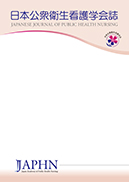Current issue
Displaying 1-11 of 11 articles from this issue
- |<
- <
- 1
- >
- >|
Forewords
-
2024 Volume 13 Issue 1 Pages 1
Published: 2024
Released on J-STAGE: April 30, 2024
Download PDF (508K)
Original Articles
-
2024 Volume 13 Issue 1 Pages 2-12
Published: 2024
Released on J-STAGE: April 30, 2024
Download PDF (378K) Full view HTML
Research Articles
-
2024 Volume 13 Issue 1 Pages 13-21
Published: 2024
Released on J-STAGE: April 30, 2024
Download PDF (367K) Full view HTML -
Perspectives on Assessment of Older Adults from the Characteristics of Questions in Case Discussions2024 Volume 13 Issue 1 Pages 22-30
Published: 2024
Released on J-STAGE: April 30, 2024
Download PDF (364K) Full view HTML
Research Articles
-
2024 Volume 13 Issue 1 Pages 31-38
Published: 2024
Released on J-STAGE: April 30, 2024
Download PDF (339K) Full view HTML
The 12th Japan Academy of Public Health Nursing Conference
-
2024 Volume 13 Issue 1 Pages 39-43
Published: 2024
Released on J-STAGE: April 30, 2024
Download PDF (2603K)
Report of the Board of Education
-
2024 Volume 13 Issue 1 Pages 44-46
Published: 2024
Released on J-STAGE: April 30, 2024
Download PDF (611K) -
2024 Volume 13 Issue 1 Pages 47-49
Published: 2024
Released on J-STAGE: April 30, 2024
Download PDF (610K)
Certification System Committee Workshop Report
-
2024 Volume 13 Issue 1 Pages 50-53
Published: 2024
Released on J-STAGE: April 30, 2024
Download PDF (1492K)
Project for the Future of Public Health Nurses: FY 2023 Report 1
-
2024 Volume 13 Issue 1 Pages 54-57
Published: 2024
Released on J-STAGE: April 30, 2024
Download PDF (1163K)
Project for the Future of Public Health Nurses: FY 2023 Report 2
-
2024 Volume 13 Issue 1 Pages 58-61
Published: 2024
Released on J-STAGE: April 30, 2024
Download PDF (654K)
- |<
- <
- 1
- >
- >|
